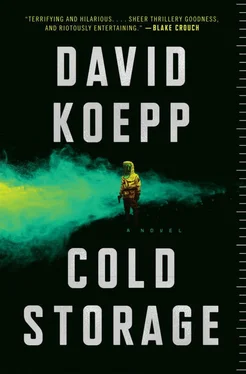Tonight Roberto had forgotten, left his phone on by accident, and it’s funny how the old reflexes kicked in when the thing rang shortly after midnight. He was wide-awake before the echo of the first ring had even faded, had his hand on the phone by the time the second ring started, and was sitting up with both feet on the floor when he answered.
“Hell,” he croaked.
Whoops. No voice. Not quite the old reflexes. He cleared his throat and tried again.
“Hello.”
“Roberto Diaz?” It was a woman’s voice.
“Speaking.”
“I’m calling about the 1978 Plymouth Duster for sale.”
He didn’t answer for a long moment.
“Mr. Diaz?”
“Give me five minutes.” He hung up and set the phone back down on the dresser. He just sat there for a few seconds, thinking. He regretted the second glass of wine at dinner, but other than that he didn’t feel much of anything at all. That’s how you knew you were good, when the call didn’t change anything, emotionally. He counted a few breaths, stayed cool, and let the Buddhist mantra he’d discovered in his early fifties float through his mind.
I’m here now.
He wanted a cup of tea before he called back.
Annie turned and looked at him over her shoulder, squinting into the dark. “Who was that?”
“My other wife.”
“How can you be funny right away in the middle of the night?”
“It’s a gift.”
She fumbled around on her night table, feeling for something and not finding it, knocking a few things around.
He looked at her. “What are you doing?”
“Looking for my glasses.”
“Why?”
She rolled over and looked at him. “I don’t know.”
She glanced around the room, as if to make sure everything was still in its place, then turned back to him. “One of the kids?”
“No. Don’t worry.”
She paused. “Oh God.”
If it wasn’t one of the kids and he hadn’t yet told her that somebody they knew was dead, then it could only be Them. It was more of a tired “oh God” that she let out than a fearful “oh God,” the kind of “oh God” you’d say if you found out the cable had gone out again.
“Yep.”
“Who?”
“New voice to me. Somebody’s having a panic attack.”
He leaned over and kissed her on the forehead. He never had cheated on her, or even thought about flirting anymore, after the experience in Australia. He was grateful for that, and for her, every day. “Go back to sleep,” he said. “I’ll make it quick.”
He got up and pulled on the clean shirt and pair of pants he kept hung over the chair so they’d be easy to find in the dark. Talk about old habits.
Annie rolled over and snuggled back into her pillow. “Don’t make it too quick. Wait till I’m asleep again, okay?”
“Wasn’t born yesterday, gorgeous.”
She muttered something sweet and inaudible and was back asleep by the time the door closed. The unexpected was still routine, even after all this time, and the calls had stopped seriously disrupting her sleep years ago.
Roberto loved being in the North Carolina house more than any other place he’d ever owned, rented, or visited. It wasn’t a great house, not by a long shot. It was late ’80s construction and the walls were too thin; you could hear water in the pipes no matter where you were. They probably should have torn the whole thing down and built a new one ten years ago when they bought it, but aside from the fact that it would have cost a fortune they didn’t have, a teardown seemed incredibly wasteful. Mean, almost. The house had behaved well in the world, it had done what was asked of it with minimal complaint for twenty years, and it deserved better than a bulldozer.
They bought it as is, recognizing its flaws, and made plans to repair and remodel in two stages. They fixed and painted the inside first, right after they bought it, and put off the decaying exterior for as long as possible, until the rotting porch and the leaking roof and the patchy siding, riddled with wasp nests, could no longer be ignored. Finally, they took a deep breath, got out the checkbook, and started the exterior work four years ago, just before they both retired. They ran out of cash with half the roof and none of the porches done.
They didn’t actually run out of money, not literally, but there were financial lines they had long ago said they’d never cross, loans they would not take out, T-bills that would not be sold, and dammit if they were about to break their own rules now, when they were so close to having enough to leave a decent college fund for each of the grandkids.
So Roberto learned roofing himself, and how to build a deck, and how to grin and put up with the manly condescension when he went back to the hardware store for the third time in the same day with more dumb questions. Just before Thanksgiving of last year, two and a half years after the last professional help had left the premises, almost four years after they’d started work on the outside, and a full decade after they’d bought the place, the house at 67 Figtree Road was done.
There was a chair on the back porch, a rocker that was good for Roberto’s bad back, just to the left of the screen door. It was his favorite spot in the world as he knew it, and he knew a fair amount of the world. That spot was where he sat now, waiting for the kettle to boil, wondering at the warm, misty March air that should have been neither warm nor misty.
Back in the kitchen, he got to the kettle before it had a chance for a full-throated scream. He poured the hot water into the strainer. He stared out the window while he let it steep—$6,200 to move the kitchen window from the driveway side to the backyard side, the most extravagant thing he had ever done, and he regretted it for not one minute since—and poured a few drops of milk into the tea after exactly three minutes. He’d picked up the milk habit while on the London detail. Turns out the milk cuts the tiny bit of acidity in the tea leaves. The things you learn.
He took a sip and went to the broom closet on the far side of the room. It was a funny angled one that wasn’t much good at holding anything, but it was the compromise solution to a thorny electrical problem he’d run into when he insisted on designing and building this one corner of the cabinetry himself. He’d allowed no help from anyone else, wouldn’t even let anybody in the room while he was working on it.
Now Roberto took the brooms and mops out of the closet, pulled out the tall vases from where they were stored in the back, and took out the small mixer that couldn’t seem to find a home anyplace else. He used a hidden key to unlock the lock on the angled panel inside, swung it open, and entered the combination into the safe.
He felt a tiny surge of adrenaline when he threw the safe handle and it made that solid, satisfying clunking sound. It wasn’t excitement, far from it, but something more like self-preservation, the old system gearing up in case it was needed. Fight or fight.
The safe was small. It didn’t need much in it, just a few currencies and passports that were probably expired by now. It wasn’t a proper run box anymore, just a place to put the secure phone and the snow globe, the one they’d bought at a gas station in Vermont, the slightly cheesy one they couldn’t resist because it had three kids sledding inside it, two girls and a boy, like theirs. He took out the emergency phone, turned it on, and the screen showed the dull red outline of a battery with a big red line through it. Roberto was surprised it even had that much juice in it. He grabbed the cord, plugged it in by the sink, and looked out the window, drinking his tea while he waited for it to charge up.
After a while, the phone binged and turned itself on. He looked at it for an extra moment, not thinking much but not grabbing it either. He wasn’t going to rush; it was just over five minutes now since he’d asked for that many, and the world wasn’t going to end if he took an extra thirty seconds. That was one of the nice things about being older, how comfortable you became with the idea of conservation of energy, of deliberateness of style. Youth was all wasted movement and noise production, thinking that the more you looked like you were doing something, the more you really were, when in fact the opposite was most often true. Do you have the patience to remain completely still until the dirty water settles and you can see clearly? Not if you’re under fifty, you don’t.
Читать дальше
Конец ознакомительного отрывка
Купить книгу











